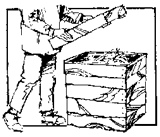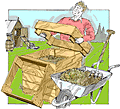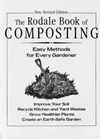
![]()
Search the Journey to Forever website – click HERE
|
Journey to Forever: Make a donation |
Navigation
| Small farms library | |
| City farms | |
| Organic gardening | |
| Composting | |
| Introduction Compost and organics What is compost? |
|
| Making compost | |
| Good compost How not to fail Greens and browns Hints Compost containers Assembling the materials Adding liquids Batches Animal manure Sifting Cold weather |
|
| Composting resources | |
| Virtual composting Core texts General composting |
|
| Composting indoors | |
| Think small Filling the bin Problems Think even smaller Resources |
|
| Vermicomposting | |
| Vermicompost and plants The worms Breeding Worm boxes Dimensions Bedding Feeding Harvesting Problems Garden wastes Using vermicompost |
|
| Vermicomposting resources | |
| Humanure | |
| Foundation work Modern developments Best of all! |
|
| Composting for small farms | |
| Foundation work On-farm composting resources |
|
| Small farms | |
Contact usTo Keith Addison Handmade Projects |
Composting resources
Virtual composting
We could easily show you how to do it, but can you learn such a practical, down-to-earth, hands-on technique as composting from the Internet? Keith learnt it from a book, or several books, but he says it wasn't easy (and he's real stubborn). In fact there are vast resources on every aspect of composting on the Internet, and it's a LOT better than a book! Keep at it and you'll get there, it's easy really. Along with the guidelines above, we recommend the first four resources below as your basic how-to guides.
Composting for dummies (and aren't we all)
Garden Organic, Britain's Organic Gardening Association (the HDRA) receives hundreds of enquiries on organic gardening every day, and years of answering them, along with the Association's vast on-the-ground experience, have helped to produce some of the best practical guides available. The following two online factsheets are a great help for beginning composters.
 Building a compost bin, by Garden Organic, Britain's Organic Gardening Association (the HDRA) – How to make a moveable, wooden compost box consisting of identical interlocking sections which are stacked one on top of the other. As the compost decreases in volume, the top sections of the box can be taken off and used to start building up a new container. Make a few extra sections and you will have a very flexible composting system. Keep the rain out with a wooden lid or square of old carpet or polythene. Makes a square compost box 75x75x75cm. Uses reclaimed timber such as floorboards or pallets.
Building a compost bin, by Garden Organic, Britain's Organic Gardening Association (the HDRA) – How to make a moveable, wooden compost box consisting of identical interlocking sections which are stacked one on top of the other. As the compost decreases in volume, the top sections of the box can be taken off and used to start building up a new container. Make a few extra sections and you will have a very flexible composting system. Keep the rain out with a wooden lid or square of old carpet or polythene. Makes a square compost box 75x75x75cm. Uses reclaimed timber such as floorboards or pallets.
http://www.gardenorganic.org.uk/schools_organic_network/
leaflets/Composting.pdf
 How to make compost, by Garden Organic – Making and using compost is the cornerstone of organic gardening. It's easy and costs very little in time or effort. Where do I make my compost? - What can I compost? - How do I make my compost? - Composting hints & tips - Composting questions answered - Composting Myths - Compostable Packaging.
How to make compost, by Garden Organic – Making and using compost is the cornerstone of organic gardening. It's easy and costs very little in time or effort. Where do I make my compost? - What can I compost? - How do I make my compost? - Composting hints & tips - Composting questions answered - Composting Myths - Compostable Packaging.
http://www.homecomposting.org.uk/content/view/12/26/
Virtual composter – Florida's Online Composting Center has a Quick Tutorial -- how to compost in five easy steps; a more detailed "Compost Happens!" Tutorial takes about 20 to 40 minutes. Also Learn More, Site Search, and a useful troubleshooting guide. The Virtual Pile (Java) calculates the carbon to nitrogen ratio for you. This is a good way to get a feel for balancing the materials. Drag up to 12 items into the bin, view the C:N ratio as you build the virtual pile: comments help you build your real pile at home. Choice of Table scraps, Fruit wastes, Green leaves, Dry leaves and pine needles, Cow manure, Grass clippings, Horse manure with litter, Wet paper or paperboard, Coffee grounds.
http://sarasota.ifas.ufl.edu/compost-info/index.shtml
Composting 101 from Organic Gardening – Learn how to make a compost pile that creates the optimal conditions for decomposition. Air + Water + Carbon + Nitrogen = Compost . Building a Compost Pile, Cold Black Gold, Some Like It Hot
http://compostingtechnology.com/resources/compost-calculator-tool/
Compost calculator at Green Mountain – Online calculator to help you calculate the right amounts of "Greens" (nitrogen) and "Browns" (carbon) needed to make your compost heap. Composting is simple when you follow the rules: a moisture content of 60-65%, enough bulk (at least 10 cubic feet), a good air supply, and a carbon/nitrogen ratio of about 30:1. The last bit's not as difficult as it sounds. This calculator will help you get a feel for it, and soon you won't need it anymore. Divide the figure for carbon % by the figure for nitrogen %: if the answer's less than 30, it's "green" – even if the colour is actually brown, like cowdung (12-25) or coffee grounds (25); if it's more than 30, it's "brown".
http://compostingtechnology.com/resources/compost-calculator-tool/
Composting at LILI, the Low Impact Living Initiative: basic information factsheet, books, courses. Covers composting, compost worms/vermiculture, compost toilets, biogas, waste & recycling, and more. Spend some time browsing LILI's site, you won't be sorry – useful resources on a wide range of planet-friendly topics.
http://www.lowimpact.org/topics_composting.htm
Core texts
The Journey to Forever Small Farms Library provides free full-text online access to the essential texts on sustainable farming and gardening and related topics. It includes many classics that are now difficult to find. This is the foundation work that put organic farming and gardening on a sound scientific basis in the first half of the 20th century, and put it into practice around the world. There are no modern replacements for these books.
An Agricultural Testament by Sir Albert Howard, Oxford University Press, 1940.
This is the book that started the organic farming and gardening revolution, the result of Howard's 25 years of research at Indore in India. The essence of organics is brilliantly encapsulated in the Introduction, which begins: "The maintenance of the fertility of the soil is the first condition of any permanent system of agriculture." Read on! Full explanation of the Indore composting process and its application. Excellent on the relationship between soil, food and health. Full text online at the Journey to Forever Small Farms Library.
The Waste Products of Agriculture -- Their Utilization as Humus by Albert Howard and Yeshwant D. Wad, Oxford University Press, London, 1931
Where Howard's An Agricultural Testament charts a new path for sustainable agriculture, this previous book describes how the Indore composting system which was the foundation of the new movement was developed, and why. Howard's most important scientific publication. Full text online at the Journey to Forever Small Farms Library.
Farming and Gardening for Health or Disease (The Soil and Health) by Sir Albert Howard, Faber and Faber, London, 1945, Devin-Adair 1947, Schocken 1972
This is Howard's follow-up to An Agricultural Testament, extending its themes and serving as a guide to the new organic farming movement as it unfolded -- and encountered opposition from the chemical farming lobby and the type of agricultural scientists Howard referred to as "laboratory hermits". Together, the two books provide a clear understanding of what health is and how it works. Full text online at the Journey to Forever Small Farms Library.
See a review of Albert Howard's work, plus a short bibliography and links to his major works and some of his published papers, at the Journey to Forever Small Farms Library.
The Earth's Green Carpet by Louise E. Howard, 1947, Faber & Faber, London
In this unusually clear book, Lady Howard (Sir Albert Howard's wife), has written a "layman's introduction" which is also a work of literary distinction. Her subject is nothing less than the life cycle studied as a whole, and this leads inevitably to the importance of a reformed agriculture for the health of the community. She saw the need for a popular introduction to her husband's revolutionary ideas and principles, and her book draws a vivid picture of what lies behind the appearance of the Earth's green carpet. "Nature is not concerned to give us simple lessons," Lady Howard says -- and yet she transmits them here with admirable simplicity and clarity, a delight to read. More than an introduction, the book is a survey of the whole body of work of the pioneers of organic farming and growing. Full text online at the Journey to Forever Small Farms Library.
Sir Albert Howard in India by Louise E. Howard, Faber & Faber, London, 1953, Rodale 1954
Albert and Gabrielle Howard worked as fellow plant scientists and fellow Imperial Economic Botanists to the Government of India for 25 years, and this is a study of their work by Sir Albert's second wife Louise (sister of Gabrielle, who died in 1930). It's a classic study of effective Third World development work. Initially involved with improving crop varieties, the pair soon concluded it was futile to fiddle with seeds unless the work took full account of the system and circumstances as a whole. Thus developed a sustained interest in putting agricultural research into its right relation with the needs of the people, and a fundamental belief in peasant wisdom. Results were useful only if they could be translated into peasant practice. This led to the development of the famous Indore system of composting organic wastes: improved seeds were no use in impoverished soils. It's a great story. Full text online at the Journey to Forever Small Farms Library.
General composting
 "Rodale Book of Composting: Easy Methods for Every Gardener" by Deborah L. Martin and Grace Gershuny, Rodale Press, ISBN 0878579915, 1992
"Rodale Book of Composting: Easy Methods for Every Gardener" by Deborah L. Martin and Grace Gershuny, Rodale Press, ISBN 0878579915, 1992
Composting is at the core of organic growing, and this encyclopaedia is Rodale's distillation of the subject in an easily accessible and readable form. From Rodale Store:
http://WWW.rodalestore.com/webapp/commerce/
servlet/ProductDisplay?prrfnbr=13100
&merchant_rn=15336
"The Rodale Guide to Composting" by Jerry Minnich and Marjorie Hunt, Rodale Press, Emmaus, Pennsylvania, 1979
This is the previous version of the composting encyclopaedia, a complete survey of the alchemy of composting at home, on the farm, and in municipalities. If you can get it, this is the best of the many versions and rewritings the book has been through. ![]() Rodale's Organic Gardening and Farming magazine was at a high point when Minnich was a senior editor. Later it split in two, Organic Gardening, and Organic Farming. We don't know what happened to Organic Farming.
Rodale's Organic Gardening and Farming magazine was at a high point when Minnich was a senior editor. Later it split in two, Organic Gardening, and Organic Farming. We don't know what happened to Organic Farming.
The manure fork is the indispensible tool for composters -- ideal for mixing the ingredients, scooping it all into the box, scooping it out again later, breaking it up, fluffing it out, turning it, scattering it over the growing beds. Get a 4-tined fork with forged, oval tines. Either a straight 48" handle or a D-grip handle will do, depending on your preference.
Cornell Composting -- extensive composting resources from Cornell University, including Composting in Schools, good set of resources and references, science and engineering of composting.
http://www.css.cornell.edu/compost/Composting_Homepage.html
RotWeb -- How to compost your yard and kitchen wastes at home. Basic information about home composting -- introduction, how-to guide, ingredients, materials to avoid and why, different compost bin systems, composting resources on the Net, demonstration sites, teacher resources, report on backyard composting programs.
http://www.a-horizon.com/compost/compost_menu.html
The Compost Resource Page -- excellent composting site. "Studies have shown that home composting can divert an average of 700 lbs. of material per household per year from the waste stream." Detailed overview, good resources on home composting and vermicomposting, also composting toilets, and Home Composting Forum. Even a Compost Poetry Corner!
http://www.oldgrowth.org/compost/
The Master Composter site -- for home composting: build a pile, compost information, and local composting programs. Everything you could want to know about making and using compost.
http://www.mastercomposter.com/
Backyard Composting, by Craig Cogger, Ph.D., Washington State University Cooperative Extension Soil Scientist, and Dan M. Sullivan, Ph.D., Associate Professor, Department of Crop and Soil Science, Oregon State University. Useful 8-page how-to, and why-to. Materials to use, hot vs cold composting, how to make compost, and more. Acrobat file, 56kb:
http://cru.cahe.wsu.edu/CEPublications/eb1784/eb1784.pdf
Soil, Compost and Mulch Forum at Gardenweb. This forum is for the discussion of all aspects of soil -- including topics like creating a healthy, balanced soil, methods of composting and using mulches effectively. Active forum, lots of threads.
http://www.gardenweb.com/forums/soil/
See also Humanure
City farms
Organic gardening
Building a square foot garden
Plant spacing guides
No ground? Use containers
When to sow what
Seeds
Garden pond
Gardening resources
Composting
Making compost
Composting resources
Composting indoors
Vermicomposting
Humanure
Composting for small farms
Small farms
Small farm resources
Community-supported farms
Farming with trees
Farming with animals
Pasture
Pigs for small farms
Poultry for small farms
Aquaculture for small farms
Composting for small farms
Controlling weeds and pests
Small farms library